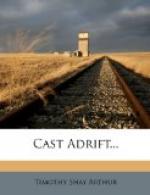Mr. Dinneford met Edith at the door on her arrival home.
“My child,” he exclaimed as he looked into her face, back to which the color had not returned since her fright in Briar street, “are you sick?”
“I don’t feel very well;” and she tried to pass him hastily in the hall as they entered the house together. But he laid his hand on her arm and held her back gently, then drew her into the parlor. She sat down, trembling, weak and faint. Mr. Dinneford waited for some moments, looking at her with a tender concern, before speaking.
“Where have you been, my dear?” he asked, at length.
After a little hesitation, Edith told her father about her visit to Briar street and the shock she had received.
“You were wrong,” he answered, gravely. “It is most fortunate for you that you took the child’s advice and called at the mission. If you had gone to Grubb’s court alone, you might not have come out alive.”
“Oh no, father! It can’t be so bad as that.”
“It is just as bad as that,” he replied, with a troubled face and manner. “Grubb’s court is one of the traps into which unwary victims are drawn that they may be plundered. It is as much out of common observation almost as the lair of a wild beast in some deep wilderness. I have heard it described by those who have been there under protection of the police, and shudder to think of the narrow escape you have made. I don’t want you to go into that vile district again. It is no place for such as you.”
“There’s a poor little baby there,” said Edith, her voice trembling and tears filling her eyes. Then, after a brief struggle with her feelings, she threw herself upon her father, sobbing out, “And oh, father, it may be my baby!”
“My poor child,” said Mr. Dinneford, not able to keep his voice firm—“my poor, poor child! It is all a wild dream, the suggestion of evil spirits who delight in torment.”
“What became of my baby, father? Can you tell me?”
“It died, Edith dear. We know that,” returned her father, trying to speak very confidently. But the doubt in his own mind betrayed itself.
“Do you know it?” she asked, rising and confronting her father.
“I didn’t actually see it die. But—but—”
“You know no more about it than I do,” said Edith; “if you did, you might set my heart at rest with a word. But you cannot. And so I am left to my wild fears, that grow stronger every day. Oh, father, help me, if you can. I must have certainty, or I shall lose my reason.”
“If you don’t give up this wild fancy, you surely will,” answered Mr. Dinneford, in a distressed voice.
“If I were to shut myself up and do nothing,” said Edith, with greater calmness, “I would be in a madhouse before a week went by. My safety lies in getting down to the truth of this wild fancy, as you call it. It has taken such possession of me that nothing but certainty can give me rest. Will you help me?”




